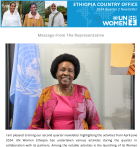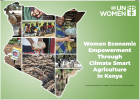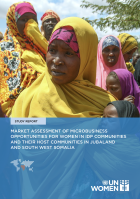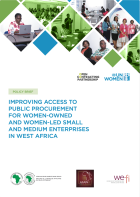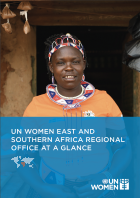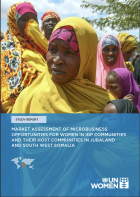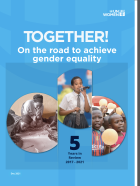1 - 19 of 19 Results
Date:
Discover the key insights and milestones of the Beijing Declaration and Platform for Action (BPfA) as we approach its 30th anniversary in 2025. This publication explores progress made, persistent challenges, and Kenya’s contributions to gender equality. Highlighting actionable steps for individuals and organizations, it connects the BPfA to the Sustainable Development Goals, emphasizing its continued relevance in driving transformative change for women and girls globally.
Date:
UN Women Ethiopia has undertaken various activities during the quarter in collaboration with its partners. Among the notable activities is the launching of its WomenEconomic Empowerment Strategy. The strategy encapsulates UN Women’s vision of empowering women to thrive and economies to prosper. It aims to dismantle the systemic barriers that prevent women from fully participating in the economy.
Another important work done during the quarter is the continuation of our effort to ensure the participation of Civil Society organizations in the transitional justice processes. To this end, a two-day national workshop on creating space for the CSOs to participate in the implementation process of transitional justice policy in Ethiopia was held in June 2024. The workshop targets women leaders from non-governmental and CSOs and representatives of grassroots community groups aimed to assess gender sensitivity of the Transitional Justice (TJ) Policy recently adopted by Ethiopia’s Council of Ministers.
Date:
The WEE-CSA Storybook showcases the success stories of over 2,400 women from Kitui, Laikipia, and West Pokot who have transformed their lives through climate-smart agriculture. Funded by KOICA and implemented by UN Women Kenya, it highlights the project's impact on livelihoods and gender equality while sharing valuable lessons learned. This collection celebrates resilience and aims to inspire further community upliftment for sustainable development in Kenya.
Date:
This survey analyses what form of publications are being sought by diverse audiences and how often the publications are consulted by the audiences. It further mapped which parties seek UN Women publications in the region and in what format they preferred.
Date:
This brief emerges from the UN Women East and Southern Africa Knowledge Management Strategy 2022-2025. In the period of the Strategic Note (2018-2021), ESARO leveraged its knowledge management (KM) strategy (2018-2021) and developed KM tools and systems and ensured a systematic approach to KM implementation across the region.
Date:
This Report presents the Africa Shared Research Agenda (ASRA) for ending gender-based violence (GBV), which was developed though a collaboration between UN Women Africa and the Sexual Violence Research Initiative. The ASRA is a set of research priorities for the field, developed through a participatory and consultative process and aims to inform investments in research over the coming 5-10 years for ending GBV in Central, East, Southern and West Africa.
Date:
The publication aims to understand the current landscape of microbusiness in terms of the opportunities, barriers and challenges that women in displacement settings face in accessing economic opportunities in the cities of Kismayo, Dollow and Baidoa
Date:
Women own 30 per cent of the small and medium businesses worldwide, yet women-owned businesses only access 1 per cent of all procurement contracts suggesting systemic gender disparities within procurement systems. This policy brief analyses the extent to and ways in which regional institutions in West Africa could adopt better policies for gender-responsive procurement.
Date:
UN Women is the UN agency mandated to promote gender equality and empowerment of women. In the East and Southern Africa Region, the organization has a presence in 13 Countries (Burundi, Ethiopia, Kenya, Malawi, Mozambique, Multi/Country Offices South Africa, Rwanda, Somalia, South Sudan, Sudan, Tanzania, Uganda, Zimbabwe). In countries where there is no presence, UN Women collaborates with the resident coordinator's office to advance gender equality.
Date:
The policy brief aims to serve as an synthesizes and presents key findings from UN Women-led research; regional online surveys and; advocacy on. making the AfCFTA work for (young) women and (young) women-led businesses, both in the design and implementation of gender-responsive AfCFTA policy reforms and complementary measures, as well as in the soon-to-be negotiated AfCFTA Protocol on Women and Youth in Trade.
Date:
Uganda's NAP Ill WPS 2021 - 2025 aims at ensuring sustained peace and security through enhanced meaningful participation of women in peace and development processes. The NAP I provides a strategic framework, through the WPS agenda, to mainstream UNSCR 1325 into national development and peace strategies, with the focus on strengthening the effective roles of women in the achievement of long-lasting peace in Uganda (MGLSD, 2021). Specifically, Uganda's NAP Ill aims to: Prevent all forms of violence and promote peace within families, communities and the nation; Promote meaningful participation of women in leadership and governance at all levels; Strengthen the capacity of women to mitigate and prevent natural and human-made disasters; and strengthen the institutional and coordination mechanism for WPS agenda at all levels.
Date:
Empowering women in the economy and closing gender gaps in the workspace is key to achieving the 2030 Agenda for Sustainable Development and achieving the Sustainable Development Goals in Somalia. The host community landowners and IDP casual laborers can jointly build their skills in climate-smart agriculture that can benefit the productivity of farms whilst also building the knowledge and skill set of IDPs.
Date:
The five years in review publication captures the progress made from 2017 to 2021 across its different focus areas: Leadership and Political Participation, Women’s Economic Empowerment, Ending Violence Against Women, Data and Statistics, HIV/AIDS and the response to the unfolding crisis caused by the COVID-19 pandemic.
Date:
The African Continental Free Trade Area (AfCFTA) an opportunity for growth and prosperity in Africa. However, because of pre-existing inequalities in African economies, the agreement’s benefits will not be distributed equally along gender lines. As the AfCFTA Secretariat is starting to draft a Women in Trade Protocol, it is important that women across the continent participate actively in the process to voice their views, interests, and needs. This advocacy brief highlights 9 important...
Date:
The working paper and accompanying policy brief provide an analysis of the progress and gaps across the continent in promoting young women’s role in decision-making and political processes across Africa. The paper further proposes recommendations for consideration by AU and AU Member States including for gender-responsive COVID 19 response and recovery plans that guarantee the participation and integration of the voices of young women.
Date:
The policy paper assesses the state of Gender Based Violence (GBV) in Africa in the context of the COVID-19 pandemic. Informed by evidence from the five African Union (AU) regions, it outlines some of the initiatives implemented in AU Member States. The paper also proposes recommendations towards multi-sectoral response and recovery efforts that address GBV as well as the related needs of women and girls in Africa.
Date:
The rapid assessment publication on Gender and Agricultural Mechanization in Ethiopia provides clear recommendations to inform the agricultural mechanization policy currently under development in the country by adding value to the process through introduction of gender responsiveness approach. The assessment also aims to strengthen enforcement of the existing agricultural mechanization by evaluating current practices in gender and mechanization in the...
Date:
UN Women East and Southern Africa continues to STEP IT UP for gender equality on a daily basis to give voice to women and girls who are still challenged with the violence, injustice, unequal opportunities and prejudices because of their gender.
Date:
In this issue : -Introduction: the gender gap in agricultural productivity -Three takeaways on the gender gap in agricultural productivity -Measuring the cost of the gender gap in agricultural productivity -Costing the factors that contribute to the gender gap in agricultural productivity -Finding the biggest bang for the buck: cost-effective policy interventions -Moving from recommendations to implementation -Appendix A: Methodology for quantifying the cost of the gender gap in...


